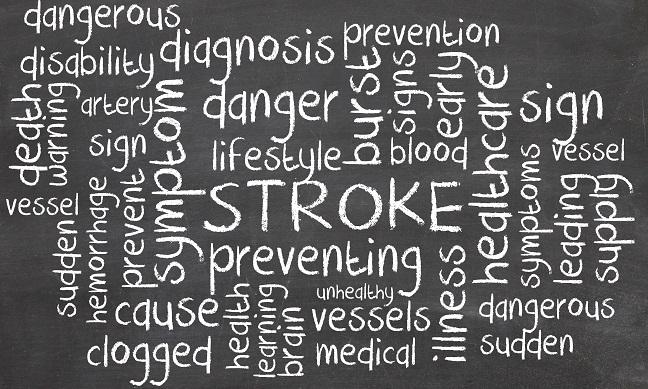Shifts in Stroke Score Over Time Help Hone Risk Prediction
Rising CHA2DS2-VASc score is linked to higher ischemic stroke risk in initially low-risk patients with A-fib, new data suggest.

Most patients who have A-fib but few additional risk factors for stroke will see their CHA2DS2-VASc score rise over time due to aging or the accumulation of additional comorbidities, and taking this into account will give clinicians a better idea about how to manage an individual patient’s risk, a new study suggests.
In fact, the so-called Delta CHA2DS2-VASc score was more closely associated with risk of ischemic stroke in a cohort of low-risk patients with A-fib than were individual baseline or follow-up values, according to a study published online ahead of the January 16, 2018, issue of the Journal of the American College of Cardiology.
“Prior studies have looked at risk factors (clinical, biomarkers, etc) at baseline and determined thromboembolic events many years later,” study author Gregory Y.H. Lip, MD (University of Birmingham, England), told TCTMD in an email. “This study suggests that a dynamic approach to assessing risk at every patient contact would be a better assessment of thromboembolic risk.”
Lip, lead author Tze-Fan Chao, MD (Taiwan Veterans General Hospital, Taipei), and colleagues looked at data from the National Health Insurance Research Database in Taiwan on 31,039 patients with A-fib who were not treated with antiplatelets or anticoagulants and who were unaffected by the variables in the CHA2DS2-VASc score (except for age and sex), including congestive heart failure, hypertension, prior stroke/TIA, and vascular disease. During follow-up lasting 171,956 person-years, 4,103 patients had an ischemic stroke.
The mean CHA2DS2-VASc score was 1.29 at baseline and 2.31 at follow-up, making the mean Delta CHA2DS2-VASc score (the difference between the two assessments) 1.02. The risk score remained unchanged from baseline in just 40.8% of patients overall, including 45.4% of those who did not have an ischemic stroke during follow-up and 10.6% of those who did. Roughly half of patients gained at least one new comorbidity, most frequently hypertension.
This study suggests that a dynamic approach to assessing risk at every patient contact would be a better assessment of thromboembolic risk. Gregory Y.H. Lip
Change in risk score was strongly related to ischemic stroke risk. The annual risk of stroke was 0.92% in patients with a Delta CHA2DS2-VASc score of 0 (no change over follow-up), rising steadily to 4.99% among those with a change of at least 4. Risk of ischemic stroke rose by a relative 52% for every 1-point increase in the Delta CHA2DS2-VASc score (HR 1.52; 95% CI 1.48-1.56).
Based on both C-index and net reclassification index, the Delta CHA2DS2-VASc score was more strongly associated with ischemic stroke risk than values measured at either baseline or follow-up.
“Although we demonstrated that the Delta CHA2DS2-VASc score performed better than the follow-up CHA2DS2-VASc score, we did not aim to propose a new scoring scheme to replace the CHA2DS2-VASc score for stroke risk assessment,” the authors write. “Our main purpose was to emphasize that the stroke risk of patients with AF may continuously increase, and careful regular evaluation and/or detection of incident comorbidities with reassessment of the CHA2DS2-VASc score and stroke prevention strategy during each patient visit are important.”
In an accompanying editorial, Brian Gage, MD (Washington University in St. Louis, MO), calls for validation of the Delta CHA2DS2-VASc score before use in clinical practice.
“Before adopting any stroke prediction rule, clinicians should ask how it will affect outcomes. For example, would use of a Delta CHA2DS2-VASc score increase the appropriate use of anticoagulant therapy? Or would it obfuscate prescription of stroke prophylaxis? More importantly, how would use of a Delta CHA2DS2-VASc score affect clinical outcomes?” he says. “Because answers to these questions are unknown, potential use of the proposed Delta CHA2DS2-VASc score awaits further research.”
Todd Neale is the Associate News Editor for TCTMD and a Senior Medical Journalist. He got his start in journalism at …
Read Full BioSources
Chao T-F, Lip GYH, Liu C-J, et al. Relationship of aging and incident comorbidities to stroke risk in patients with atrial fibrillation. J Am Coll Cardiol. 2018;71:122-132.
Gage BF. Stroke prediction rules in atrial fibrillation. J Am Coll Cardiol. 2018;71:133-134.
Disclosures
- The study was supported in part by grants from the Ministry of Science and Technology, and Taipei Veterans General Hospital, Taipei, Taiwan.
- Lip reports serving as a consultant for Bayer/Janssen, Bristol-Myers Squibb/Pfizer, Biotronik, Medtronic, Boehringer Ingelheim, Microlife, and Daiichi Sankyo; and as a speaker for Bayer, Bristol-Myers Squibb/Pfizer, Medtronic, Boehringer Ingelheim, Microlife, Roche, and Daiichi Sankyo
- Chao and Gage report no relevant conflicts of interest.


Comments